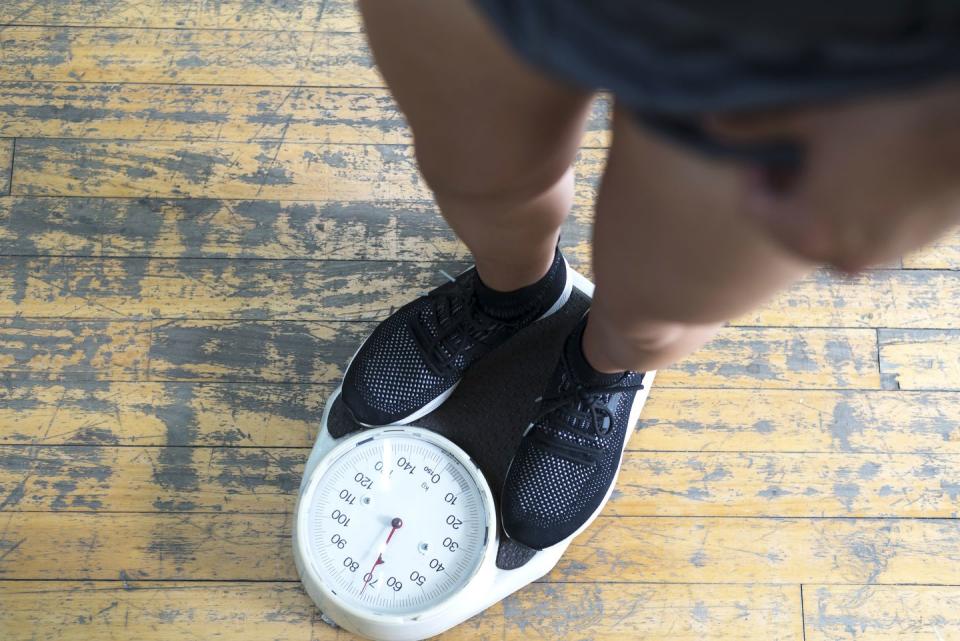Hormone Hacking Is the Weight-Loss Secret You Don't Know
For as long as humans have existed, hormones have motivated what we do. Hormones drive the need to eat, sleep, and … keep humanity in existence.
But it’s only recently that these chemicals have motivated people to do something else: bicker over who is right about the chemicals.
On one side, you have the likes of The Biggest Loser, a show that even in its more body-conscious 2020 reboot argues that diet and exercise are all you need in order to achieve the weight loss and fitness goals you set.
What’s going on within your body from a chemical standpoint isn’t as important as what’s happening to your body from a mechanical standpoint.
On the other side, you have the cadre of “hormone diet” books that place all their importance on tweaking how your hormones work by following very specific plans.
For one, Dr. Colbert’s Hormone Health Zone, released last year, promises to help you “feel 25 again”—except largely with the help of Dr. Colbert’s Thyroid Zone and Hormone Zone supplements, which cost a pricey $40 each a bottle.
The truth is somewhere in between these two squabbling factions, says Theodore C. Friedman, M.D., Ph.D., a professor of medicine at UCLA and founder of GoodHormoneHealth.com.
Friedman and his team have been researching hormones for decades, and they’ve learned that while hormones do play a role in losing weight, gaining muscle, and sleeping well it’s within a world of already healthy habits.
Friedman gets that that’s tough: “Everything form work-from-home jobs to stress that never turns off to adding more or less protein to your diet can affect your hormones,” Friedman says.
Which is why, right now, in a world bombarded by distress, you should make a few simple changes to the safeguards you’ve already put into place to protect your health.
The hormone hacks that follow will help you fight back against weight gain and, in turn, the diseases it can cause: heart disease, diabetes, and even some kinds of cancer.
Granted, there are dozens of hormones, so we’ve created a crash course on how you can make ten of the big ones work better for you. That sounds complicated. (It’s not.) Here’s how to do it.
Leptin and Ghrelin

Blame these two hormones when your gut grumbles an hour after you ate dinner. Leptin, a hormone your fat tissues release, alters your appetite long-term by telling your brain when you’ve stored enough fat.
Ghrelin, a hormone made in the gut, tells your brain you’re hungry. If either one is out of whack, cravings strike, and a pre-bed bowl of Frosted Flakes quickly follows.
Hack it: Protein, protein, protein. Eating at least 30 grams of the nutrient at each meal reduces ghrelin, which is why you feel so full after housing a rib eye.
And then there’s the fact that regularly eating enough protein may lead to increased leptin sensitivity in the brain. Thirty grams is about a palm-sized amount, says Brian St. Pierre, R.D., C.S.C.S., director of performance nutrition at Precision Nutrition and a Men’s Health advisor.
Yes, that includes non-rib-eye vegetarian sources like tofu and tempeh. Frosted Flakes? Not so much.
Cortisol

Levels of this stress hormone peak in the morning, decline throughout the day, and drop at night. That’s normal. But exposure to chronically high amounts of stress (if you’ve been through, say, a prolonged worldwide pandemic) stimulates production of cortisol, which can cause muscle breakdown and a redistribution of body fat to your gut.
“High cortisol levels at night are one of the biggest causes of weight gain, especially belly fat,” says Theodore C. Friedman, M.D., Ph.D., a professor of medicine at Charles R. Drew University and UCLA who has studied hormones for decades.
Hack it: Designate a “phone bowl” in your bedroom—ideally one that’s far enough away from your bed that it’s a pain to go fetch. When your evening wind-down routine (you have one of those, right?) begins, the phone goes in the bowl.
This means no mindless “checking” in bed, which means no sleep lost to the smartphone abyss. Another perk: A great night of sleep is a natural stress-reliever.
HGH and IGF-1

Your pituitary gland (throwback to puberty!) produces HGH, which stimulates the production and secretion of IGF-1 by your liver.
Both are growth hormones that break down fat and use the energy to strengthen your muscles. Which is also probably why you were so lean and lanky in middle school, when these hormones were at their peak.
Hack it: Set a snack curfew. Don’t eat anything for two hours before you go to bed. Food will tamp down the natural surge in growth hormones during the early hours of the night. (No, staying up later will not produce this same effect.) As incentive, know that losing ten to 20 pounds can raise your IGF-1 level, says Dr. Friedman.
Insulin

This hormone keeps your blood sugar in check and helps your body store fat and build muscle. Weight gain can lead to insulin resistance, which means that your cells aren’t able to respond well to it.
So your pancreas has to compensate by producing more, and over time, the combination of a high insulin level and insulin resistance can make it harder to lose weight.
Hack it: Instead of “low carb,” go “slow carb.” Your digestive system requires more time to process nutrient-dense carbohydrates. These foods slow digestion and help you stabilize blood-sugar and insulin levels, says St. Pierre. Berries, beans, squash, zucchini, tomatoes, peppers, and carrots are all slow carbs.
T3 and T4
Your thyroid is a small but mighty gland that sits beneath your Adam’s apple. Its main job is regulating T3 and T4, two chemicals that manage your metabolic rate. (That’s how many calories you burn at rest.)
Hack it: Go nuts—or fish. Your thyroid produces T3 and T4 with the help of selenium, a mineral found in high amounts in Brazil nuts, tuna, and halibut, says Dr. Friedman.
“Two hundred micrograms a day could optimize levels of thyroid hormones, as long as your thyroid is working well.” Just three Brazil nuts or seven ounces of cooked yellowfin tuna will put you well over that amount.
Irisin

As if all this hormone stuff weren’t confusing enough, scientists have discovered this “exercise hormone” within the past decade.
Irisin may have the superpower of converting white fat (linked with an unhealthy metabolism) to brown fat (linked with pure, unbridled calorie burn).
Hack it: Mix up your workouts. If you’re not throwing a high-intensity interval training (HIIT) workout or two into your weekly routine, it’s time. This doesn’t have to be a set plan—just do 30 seconds of jump rope (or jumping jacks) between weight sets, or a few sprints on your usual run or even between lifting sets.
Testosterone
You know “T” as the muscle-building hormone, but it also pulls double duty. Men with low T tend to gain fat more easily, says Mike Roussell, Ph.D., a Men’s Health nutrition advisor.
Hack it: Give it a rest. Even one week of poor sleep can significantly lower your testosterone level, says Roussell. One saboteur: sleep apnea, which has also been linked to low T, says Dr. Friedman. If you do sleep seven to nine hours a night but still feel tired during the day, talk to your doctor. An at-home sleep test may qualify you for apnea treatments.
You Might Also Like

